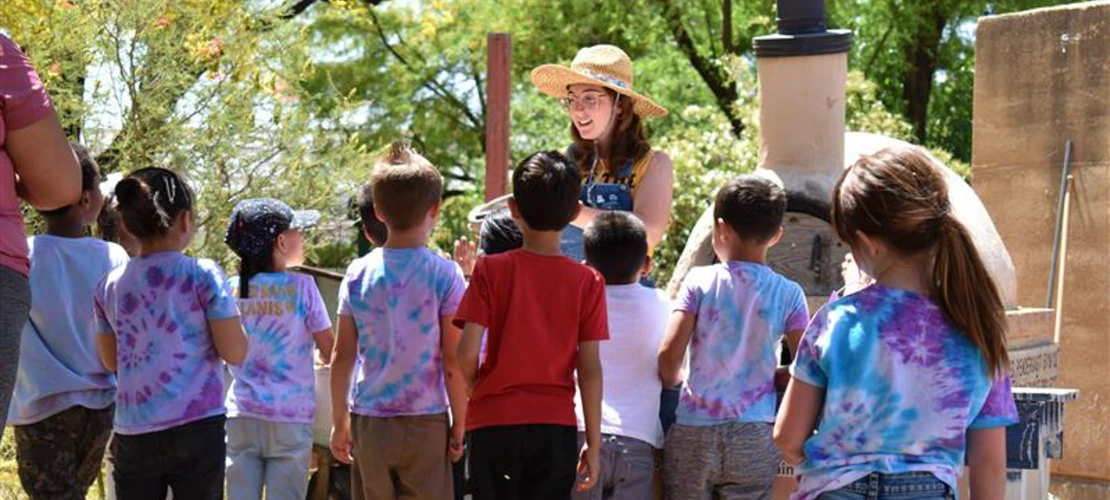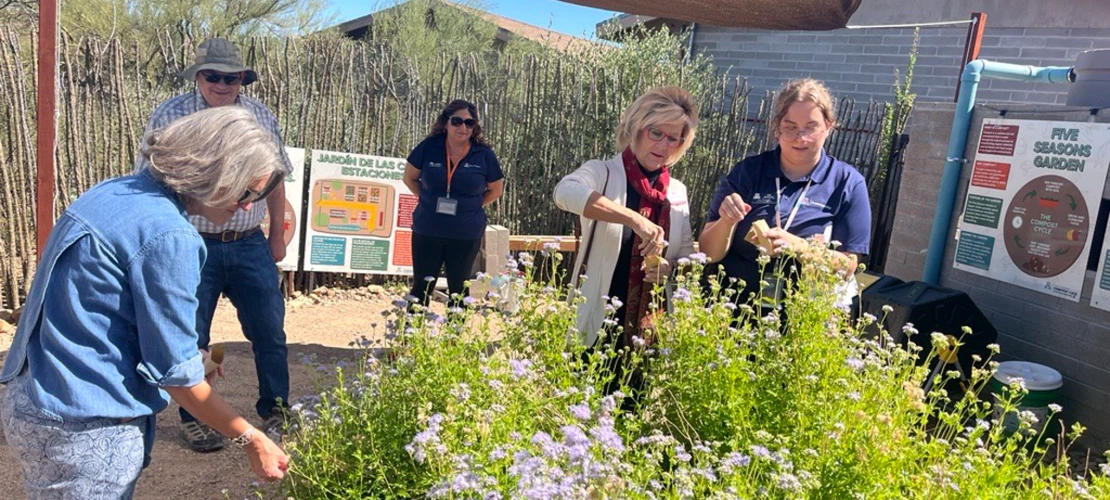Compost Cats Cut Waste
U of A’s Compost Cats partner with Kroger Co. to reduce food waste in Tucson.
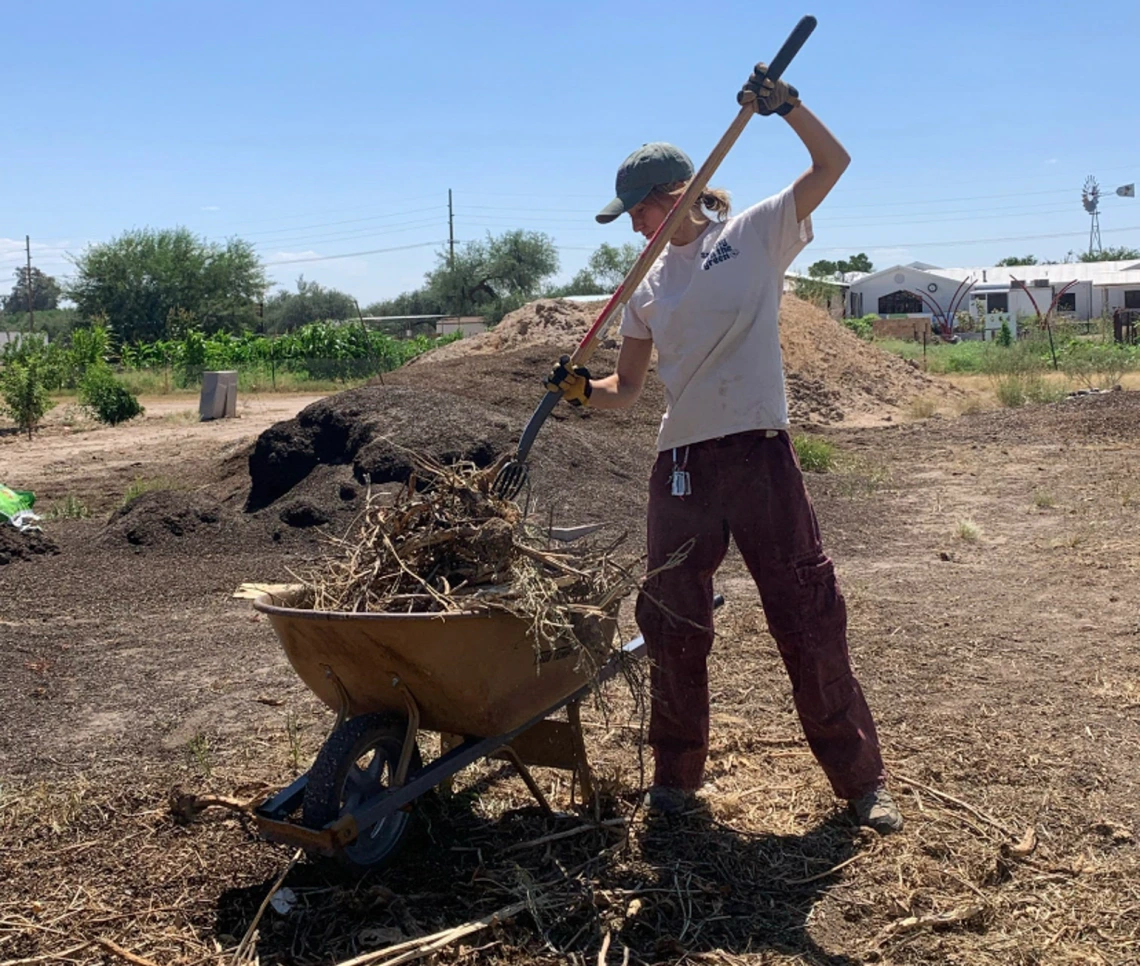
Greta Cotraccia collecting dry, carbon-rich plant material to add to compost at Tucson Village Farm.
Photo provided by Greta Cotraccia
How much food do you throw away each day? Each week? Each year?
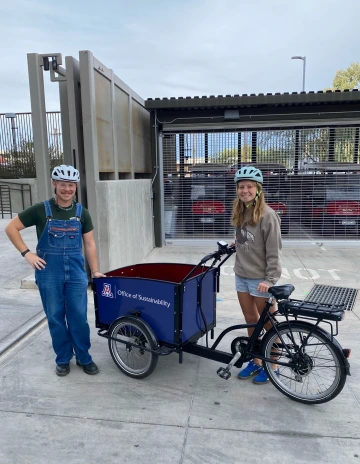
Brandon Green and Greta Cotraccia drive an electric bike to conduct an audit of the compost bins on campus.
Photo provided by Greta Cotraccia
According to Ilse Rojas-Hamilton, associate director of the University of Arizona Office of Sustainability, between 30-40% of food dedicated to human consumption is wasted in the U.S., with the average individual wasting over 300 pounds of food every year.
The Compost Cats program, a part of the sustainability office, is taking action to reduce food waste, increase food security and empower the community through composting. It’s one of the largest university-based compost initiatives in the country: Last year, it diverted over 635,000 pounds of food waste and donated more than 200,000 pounds of finished compost to local community gardens. Since its inception over 10 years ago, Rojas-Hamilton estimates that Compost Cats has diverted more than 30 million pounds of food from landfills.
“I’m very passionate about sustainability,” Rojas-Hamilton says. “All of us can be a part of making this a better world.”
The Kroger Co. Zero Hunger | Zero Waste Foundation has partnered with Compost Cats since 2019 to reduce food insecurity and waste. Kroger also supports the U of A Rooftop Greenhouse, which donates its sustainably grown produce to the Campus Pantry — which, in turn, provides supplemental groceries to students, staff and faculty at no cost. In 2024, Rooftop Greenhouse grew over 2,230 pounds of fresh produce to support Wildcats in need.
Kroger’s support focuses on three areas: student experience, environmental impact and student-run community engagement programs at Compost Cats demonstration sites at the Cooper Center for Environmental Learning, Tucson Village Farm and the U of A Community Garden. Together, these sites host up to 150 K-12 students a week and engaged more than 6,700 people last year.
“Thanks to Kroger, we were able to establish these demonstration sites where we host programming to make the community more aware about what food waste is, how we can prevent it and what we can do to be more conscious about our environment,” Rojas-Hamilton says. “We inspire them to do the right thing.”
Program participants aren’t the only ones learning; student workers gain job skills and knowledge. No previous composting experience is necessary, and students come from a wide range of majors.
“Before Compost Cats I wasn’t super knowledgeable about [compost], I wasn’t passionate about it,” says Greta Cotraccia, a junior environmental studies major and one of the 15 Compost Cats student workers funded through Kroger each semester. Now she loves getting other people excited about waste diversion.
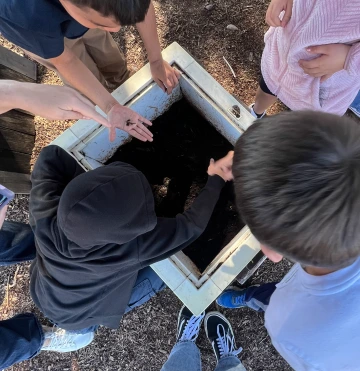
K-5 students discover worms and vermicomposting systems.
Photo provided by Compost Cats
“It feels like something in my life that I have a lot of control over when I’m trying to live more sustainably,” she adds. “It’s really become a big part of my identity.”
Rojas-Hamilton says student workers like Cotraccia are critical to operations and one of the most rewarding aspects of her job.
“I have the opportunity to plant the seed in our students and see how they become amazing professionals making a difference and moving the needle to make this world a more sustainable place with less waste,” she says, noting that student workers also bring in some of the Cats’ best ideas.
“A lot of our projects and initiatives came from student ideas,” she says. “They’re a part of the process, they can make change, they can feel empowered.”
Cotraccia has been with the Cats since freshman year, working her way up to maintenance team lead — an experience that has allowed her to see the direct, tangible results of her work.
“Knowing how much went into digging [rainwater harvesting] basins and then seeing plants growing in them and that the kids love them — it’s super rewarding,” she says.
"Composting is a really easy way to feel good about what you’re doing with your waste and the impact you’re having on the planet,” she adds. “It’s a learning process, but we’re all in it together.”


